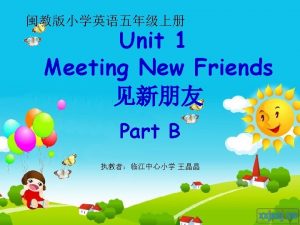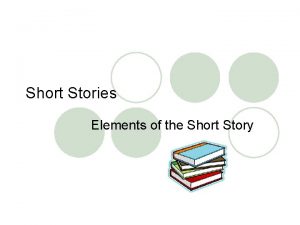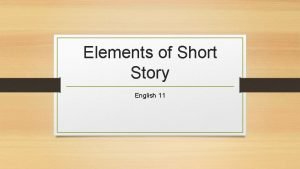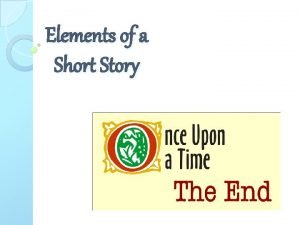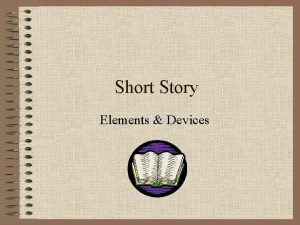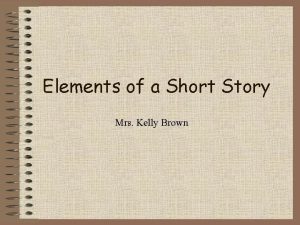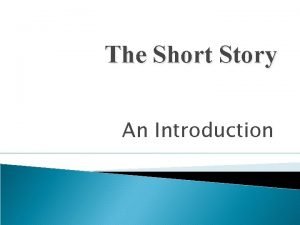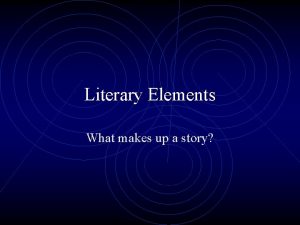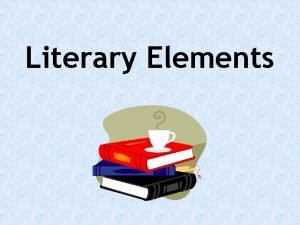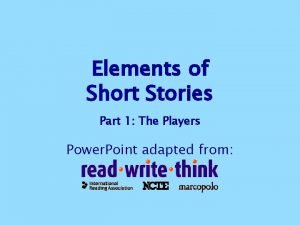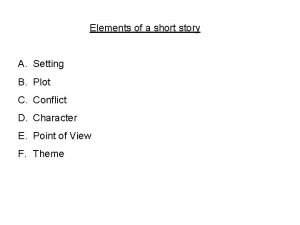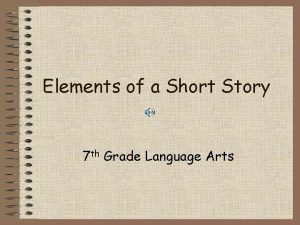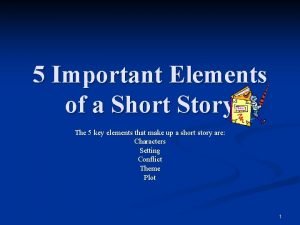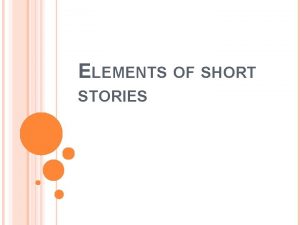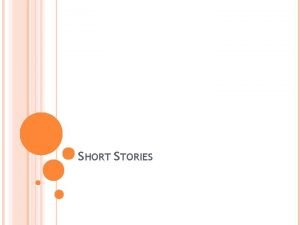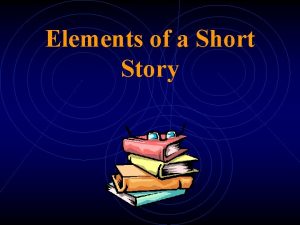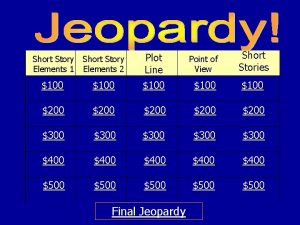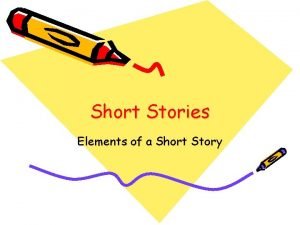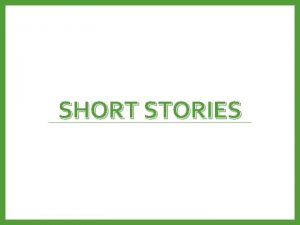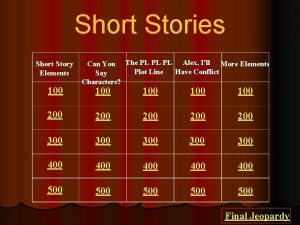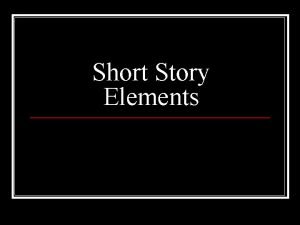Short Stories Elements of the Short Story Short













- Slides: 13

Short Stories Elements of the Short Story

Short Story Vocabulary l PLOT - The plot is a planned, logical series of events having a beginning, middle, and end. l The short story usually has one plot so it can be read in one sitting.

Short Story Vocabulary l SETTING l Tells the reader where and when the story takes place ¡ place - geographical location ¡ time - When is the story taking place? (historical period, time of day, year, etc) ¡ weather conditions - Is it rainy, sunny, stormy, etc? ¡ social conditions - What is the daily life of the character's like? ¡ mood or atmosphere - What feeling is created at the beginning of the story?

5 Essential Parts of Plot l 1) INTRODUCTION - The beginning of the story where the characters and the setting is revealed. l 2) RISING ACTION - This is where the events in the story become complicated and the conflict in the story is revealed (events between the introduction and climax).

5 Essential Parts of Plot 3) CLIMAX - This is the highest point of interest and the turning point of the story. ¡ The reader wonders what will happen next; will the conflict be resolved or not? ¡ Climax is a three-fold phenomenon: l 1) the main character receives new information l 2) accepts this information (realizes it but does not necessarily agree with it) l 3) acts on this information (makes a choice that will determine whether or not he/she gains his objective).

5 Essential Parts of Plot l 4) FALLING ACTION - The events and complications begin to resolve themselves. The reader knows what has happened next and if the conflict was resolved or not (events between climax and denouement). l 5)DENOUEMENT - This is the final outcome or untangling of events in the story.

Short Story Vocabulary l RESOLUTION – The story’s action after the climax l THEME - controlling idea or central insight in a piece of fiction. ¡ It is the author's underlying meaning or main idea that he is trying to convey. ¡ may be the author's thoughts about a topic or view of human nature. ¡ The title of the short story usually points to what the writer is saying and he may use various figures of speech to emphasize his theme, such as: symbol, allusion, simile, metaphor, hyperbole, or irony.

Short Story Vocabulary l CONFLICT - It is the opposition of forces which ties one incident to another and makes the plot move. ¡ Conflict is essential to plot. ¡ Conflict is not merely limited to open arguments, rather it is any form of opposition that faces the main character. ¡ Within a short story there may be only one central struggle, or there may be one dominant struggle with many minor ones.

Conflict l There are two types of conflict: l 1) External - A struggle with a force outside one's self. l 2) Internal - A struggle within one's self; a person must make some decision, overcome pain, quiet their temper, resist an urge, etc. l There are four kinds of conflict: 1) Man vs. Man (physical) - The leading character struggles with his physical strength against other men, forces of nature, or animals. l 2) Man vs. Circumstances (classical) - The leading character struggles against fate, or the circumstances of life facing him/her. l 3) Man vs. Society (social) - The leading character struggles against ideas, practices, or customs of other people. l 4) Man vs. Himself/Herself (psychological) - The leading character struggles with himself/herself; with his/her own soul, ideas of right or wrong, physical limitations, choices, etc.

Short Story Vocabulary l POINT OF VIEW - the angle from which the story is told. ¡ 1. Innocent Eye - The story is told through the eyes of a child (his/her judgment being different from that of an adult). ¡ 2. Stream of Consciousness - The story is told so that the reader feels as if they are inside the head of one character and knows all their thoughts and reactions. ¡ 3. First Person - The story is told by the protagonist or one of the characters who interacts closely with the protagonist or other characters (using pronouns I, me, we, etc). The reader sees the story through this person's eyes as he/she experiences it and only knows what he/she knows or feels.

The Main Bits Pl ot Elements of a Short Story: 1. Setting 2. Characterization Climax 3. Plot Rising Falling 4. Conflict Action 5. Climax 6. Resolution 7. Theme Setting Resolution Introduction Denouement 8. Point of View

Short Story Vocabulary l CHARACTER - The person in a work of fiction. Two types of characters: 1. PROTAGONIST - character is clearly central to the story with all major events having some importance to this character 2. ANTAGONIST - The opposition to the main character

Short Story Vocabulary l CHARACTER - The characteristics of a person. ¡Characterization - the information the author gives the reader about the characters themselves. l The author may reveal a character in several ways: a) his/her physical appearance b) what he/she says, thinks, feels and dreams c) what he/she does or does not do d) what others say about him/her and how others react to him/her l Characters are convincing if they are: consistent, motivated, and life-like (resemble real people)
 Tall + short h
Tall + short h Short story elements
Short story elements The five story elements
The five story elements Elements of short story
Elements of short story Elements of a short story
Elements of a short story 5 elements of a short story
5 elements of a short story Good moral stories
Good moral stories Elements of writing
Elements of writing Elements of a short story video
Elements of a short story video Cinderella story elements
Cinderella story elements Elements of a short story powerpoint
Elements of a short story powerpoint Elements of a short story setting
Elements of a short story setting Elements of a short story grade 7
Elements of a short story grade 7 Short story with 5 elements
Short story with 5 elements
